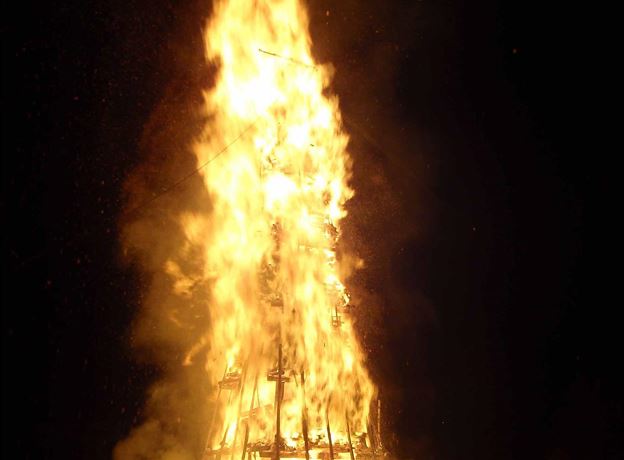Traditional burning of sparks in Bludenz (Brunnenfeld)

Traditional spark burning in Bludenz/Brunnenfeld
09.03.2025
Anyone traveling in Vorarlberg on the first weekend after Ash Wednesday will be surprised to see burning towers and imposant fires everywhere. In some places burning discs are flung through the air, in others children with lanterns wander through the village.

Traditional spark burning in Bludenz/Brunnenfeld
09.03.2025
The traditional "Funkenabbrennen" (burning of the sparks) is an ancient Swabian-Alemannic tradition, the origin is not completely clear. Some may think that the burning of wooden towers and witch dolls is a remnant of the terrible witch burnings in early modern times, but this is a misconception! The origins of the fires can be found, on the one hand, in ancient pagan fertility rites with sacrificial fires, and on the other hand, in the end of the Swabian-Alemannic "Fastnacht" and the beginning of Carnival. In Vorarlberg, the practice of "Funken" has a long tradition; in almost every community, a spark fire is organized by the local spark guild, the local fire department or the carnival guilds. In 2010, Vorarlberg's "Funkensonntag" was even included in the world cultural heritage.
Every year on "Funkensonntag" (Sunday of the weekend), the so-called "Funkentanne" is lit. This is a piled wooden tower, consisting of collected materials, such as old Christmas trees. According to popular belief, the spark is supposed to drive away winter and ignite happiness. As a symbol of the beginning of spring is the winter witch, which is attached to the top of the spark. It is usually prepared with black powder so that it can explode in the fire. Once the spark is lit, the spark master gets nervous... not without reason! He waits for the witch to explode - if it does not, it must be buried the next day.
In Vorarlberg, "Funkensonntag" has a second name: "Küachlisunntig" - here the name says it all! The delicious little cakes from yeast dough, refined with powdered sugar, not only make the hearts of the spark guild members beat faster. Eating "Funkaküachli" is a must during a visit to the Funken - and if you can't get enough of it, you can easily bake the pastry at home - here's the recipe.
There are numerous exciting customs surrounding the "Funken", which are carried out differently in each valley - even in the individual villages.
The tradition of burning sparks has an eventful history in Bludenz. In earlier times, in and around Bludenz, especially the so-called "Scheibenschlagen" was practiced. This custom is still practiced in some communities in Vorarlberg on "Funkensonntag". Wooden discs are attached to wooden sticks and made to glow. The glowing discs draw a luminous arc in the night sky and are then hurled into the darkness.
In 1741, the Bludenz City Council banned and severely punished disc cutting. 24 years later, even spark burning was banned in Bludenz, as the custom was considered economically and socially harmful. This ban was later introduced throughout Vorarlberg with the help of the relevant provincial authorities.
It was difficult to dissuade the population of Vorarlberg from continuing the custom. In Bludenz, there were several conflicts on "Funkensonntag". But it was not until the end of the 18th century that there was more tolerance on the part of the legislators, and the significance of the sparking custom became an increasingly frequent topic of discussion in society.
The burning of sparks was forbidden and executed until the 60s of the 19th century. In Bludenz, the symbolic end to years of conflict was drawn in 1893, when the first sparking event was officially approved by the authorities. In the same year, the world's first sparking regulations were written down in the Gasthaus Hirschen in Bludenz.
Around the sparking fire there are numerous, ancient traditions, which are carried out differently in each valley - even in the individual villages. However, not only the old traditions, but also new ideas keep the sparking custom growing.
Until 2019, the center trunk of the Bludenzer Funken was covered with pallets and filled with Christmas trees. However, due to the decrease in available space, the safety distance could no longer be guaranteed, so in 2020 a Bludenzer Funken was built in a new design. The spark will be built with only a few pallets and without Christmas trees. The highlight of the new spark is the cladding by more than 2000 tree slices, the so-called "cookies".
In the community of Nüziders, the spark is erected in a pyramid-like form from three spark slats. The inside is filled with wood, which is traditionally prepared during the annual "Funkenholzen". The spark master himself carries the spark witch, "Lucrezia von der Holderstaude" (named after the Holder's shrub that stands in the immediate vicinity), to the top of the spark and fastens it there. In the Kindergarden, lanterns are made, which are carried through the village on the evening of "Funkensonntag" as part of a ceremonial procession. After the procession, the spark is lit by the mayor and the spark master. For the children torches are made in advance, which they swing parallel to the spark fire into the night sky. After the witch has said goodbye, fireworks are set off. If "Lucrezia von der Holderstaude" is not released by the big bang, she is buried in the presence of the population at a witch funeral.
Sources:
Vorarlberg Tourismus, Wikipedia, UNESCO Funkensonntag, Funkenzunft Bludenz Webseite, Feuerwehr Nüziders, https://cdn3.vol.at/2008/03/Infos_funken.pdf, https://www.funkenzunft.com/category/funken/, http://apps.vorarlberg.at/vorarlberg/pdf/bg114-115tschaiknerfasnac.pdf, https://www.funkenzunft.com/category/funken/, Heimatleuchten: Wilder Winter
A short moment
We prepare the content…